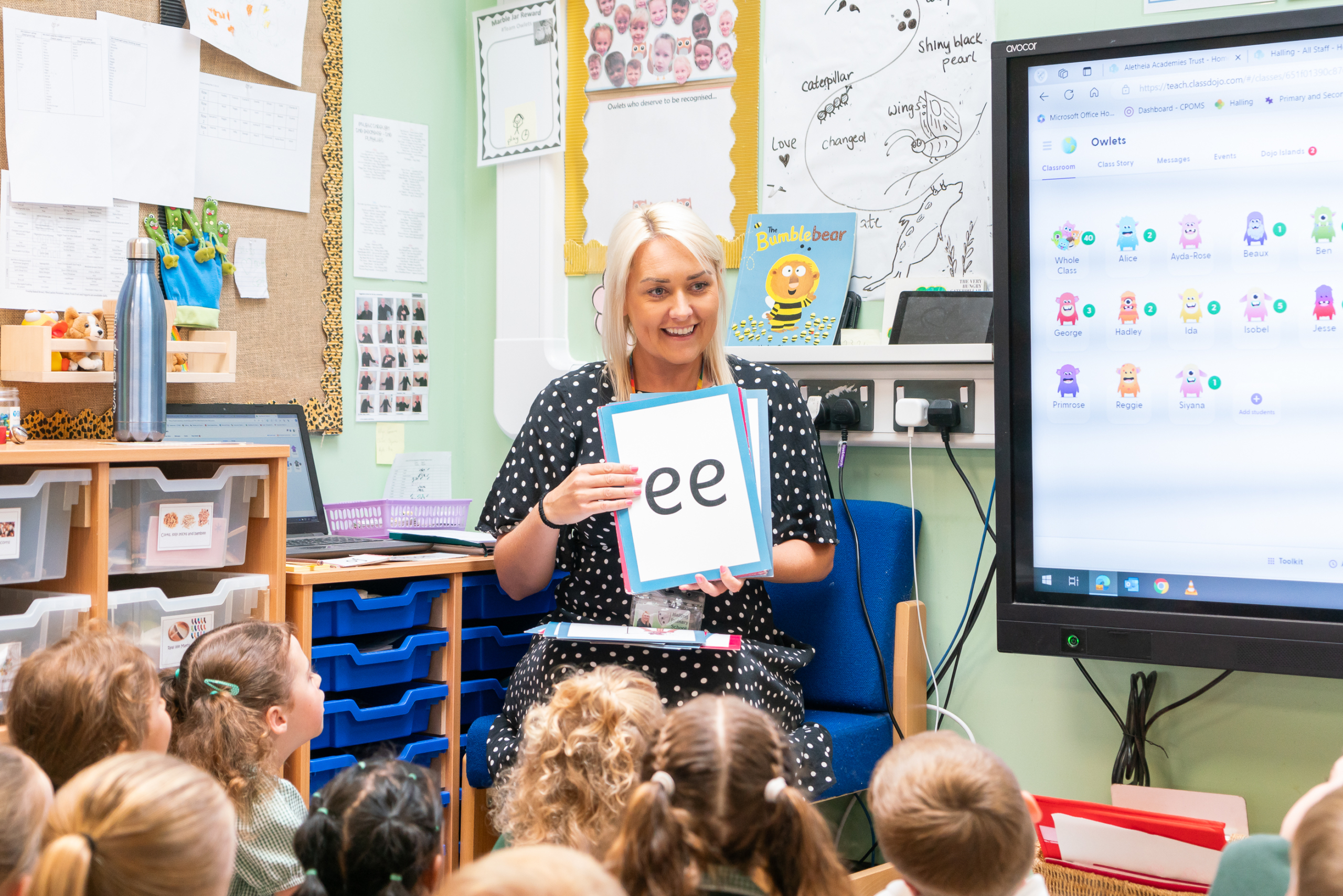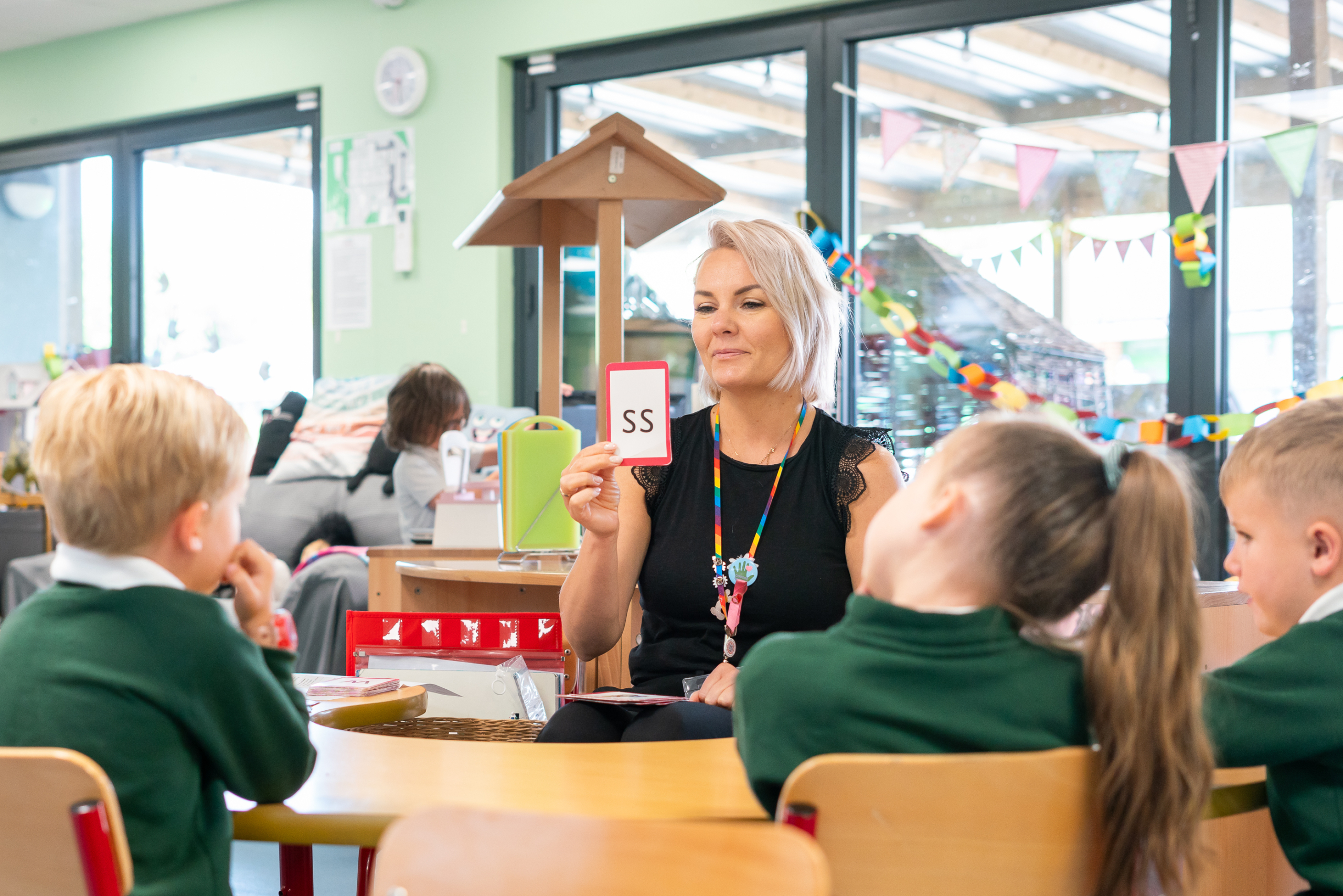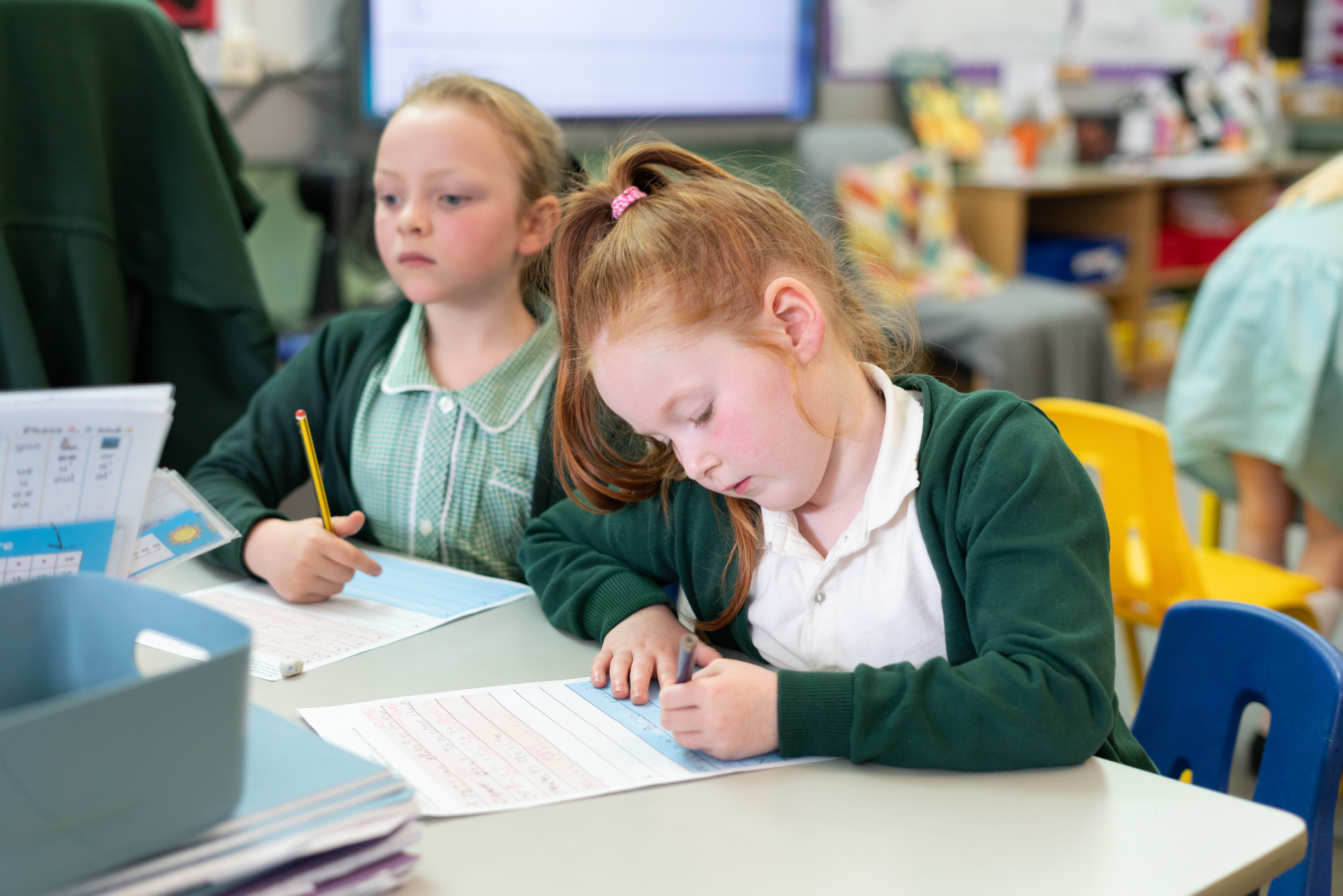Phonics Subject Leader: Mrs C Coleman and Miss E Donovan
We follow a systematic approach for the delivery of phonics by using the Little Wandle phonic scheme. Our children have access to both paper copy books which run alongside the delivery of phonics as well as online resources for them to access at home. We teach the children the reading skills that will get them on the road to independent reading. Opportunities for reading and writing for different purposes will be given during adult-initiated sessions, as well as being rooted in all areas of our classroom provision, encouraging the independent application of new knowledge and skills.

Intent
Phonics (Reading and Spelling)
At Halling Primary School, we believe that all our children can become fluent readers and writers. This is why we teach reading through Little Wandle Letters and Sounds Revised, which is a systematic and synthetic phonics programme. We start teaching phonics in Reception and follow the Little Wandle Letters and Sounds Revised progression, which ensures children build on their growing knowledge of the alphabetic code, mastering phonics to read and spell as they move through school.
As a result, all our children are able to tackle any unfamiliar words as they read. At Halling Primary School, we also model the application of the alphabetic code through phonics in shared reading and writing, both inside and outside of the phonics lesson and across the curriculum. We have a strong focus on language development for our children because we know that speaking and listening are crucial skills for reading and writing in all subjects.
Comprehension
At Halling Primary, we value reading as a crucial life skill. By the time children leave us, they read confidently for meaning and regularly enjoy reading for pleasure. Our readers are equipped with the tools to tackle unfamiliar vocabulary. We encourage our children to see themselves as readers for both pleasure and purpose.
Because we believe teaching every child to read is so important, we have a Phonic and Early Reading Leader and a Reading Leader who drives the Reading Programme in our school. Our leaders are highly skilled at teaching phonics and reading, and they monitor and support our Reading Team, so everyone teaches with fidelity to the Little Wandle Letters and Sounds Revised programme.


Implementation
Daily Phonics Lessons in Reception and Year 1
- We teach phonics for between 20 and 25 minutes a day. In Reception, we start with 10-15minute lessons progressing to 20-25 minutes. Each Friday, we review the week’s teaching to help children become fluent readers. In Year One a typical Phonics lesson will last between 20-25 minutes.
- Children make a strong start in Reception: teaching begins in Week 2 of the Autumn Term.
- We follow the Little Wandle Letters and Sounds Revised expectations of progress:
- Children in Reception are taught to read and spell words using Phase 2 and 3 GPCs, and words with adjacent consonants (Phase 4) with fluency and accuracy.
- Children in Year 1 review Phases 3 and 4 and are taught to read and spell words using Phase 5 GPCs with fluency and accuracy.
Daily Keep-Up Lessons Ensure Every Child Learns to Read
- Any child who needs additional practice has daily Keep-Up support, taught by a fully trained adult. Keep-Up lessons match the structure of class teaching and use the same procedures, resources and mantras, but in smaller steps with more repetition, so that every child secures their learning.
- We timetable daily phonics lessons for any child in Year 2 who is not fully fluent at reading or has not passed the Phonics Screening Check. These children urgently need to catch up, so the gap between themselves and their peers does not widen. We use the Little Wandle Letters and Sounds Revised assessments to identify the gaps in their phonic knowledge and teach these using the Keep-Up resources – at pace.
- If any child in Years 3 to 6 has gaps in their phonic knowledge when reading or writing, we plan phonics ‘Rapid Catch Up’ lessons to address specific reading/writing gaps. These short, sharp lessons last 10 minutes and take place daily.
Impact
Assessment
Assessment is used to monitor progress and identify any child needing additional support as soon as needed.
- Assessment for Learning is used:
- daily within the class to identify children needing Keep-Up support
- weekly in the Review Lesson to assess gaps, address these immediately and secure fluency of GPCs, words and spellings.
- Summative Assessment is used:
- every six weeks to assess progress, identify gaps in learning that need to be addressed, identify any children needing additional support and plan the Keep-Up support that they need.
- by SLT and scrutinised through the Little Wandle Letters and Sounds Revised assessment tracker, to narrow attainment gaps between different groups of children and so that any additional support for teachers can be put into place.
Statutory Assessment
- Children in Year 1 sit the Phonics Screening Check. Any child not passing the check re-sits it in Year 2.
Ongoing Assessment for Catch-Up
- Children in Years 2 to 6 are assessed through their teacher’s ongoing formative assessment and the half-termly Little Wandle Letters and Sounds Revised summative assessments.
- Pupils are identified for the Rapid Catch Up Scheme are assessed for gaps in knowledge and placed a specific phase pathway.
- After approximately four weeks, pupils will be re-assessed for progress and the next phase pathway will be identified and embarked upon.

Phonics in Each Stage
In Reception and Year 1, phonics is taught daily with a review session on a Friday which recaps the learning that has taken place during the week. Throughout the week, children will be introduced to new graphemes and decoding strategies as well as common exception words (words that cannot be decoded using phonetic strategies).
Phonics starts within the first three weeks of Reception, with lessons starting at 10 minutes and building towards 20 minutes over the year. By the end of Reception, the children will have been taught up to Phase 4.
In Reception children apply their phonetic knowledge by using fully decodable books in small group practice reading sessions. These sessions are 15 minutes long and take place 3 times a week, with each session focusing on a different skill. At the beginning of each session, the children go over different sounds, words and common exception words that will be in the text and then have the opportunity to read through the text at their own pace.
The first session focuses on decoding and identifying words and sounds in the text, the second session focuses on prosody (becoming a reader and reading with expression) and the third session focuses on comprehension.
By the end of Year 1, the children should have had the opportunity to learn all of Phase 5 GPCs.
For any child who does not pass the phonics screening or still requires phonics intervention, phonics teaching continues in Year 2-6 using the Rapid Catch Up Scheme.
SEND Information
Our SEND and disadvantaged pupils are given the necessary support in class to fully access the supported Phonics curriculum. Learning is adapted where necessary to support SEND/EAL pupils to give equal opportunities for all to be confident in approaching any problems faced. Interventions, support and challenges are constantly revised and adapted to ensure all children are supported in achieving learning. The above areas are robustly and continuously monitored to ensure any gaps in learning are addressed.
Home Learning
Phonic books will be sent home. Teachers will put the GPC’S the children have learnt in their Phonic sessions, in their Phonic Books, for the children to take home. Regular practice of these GPC’s will support your child in their reading and writing.

